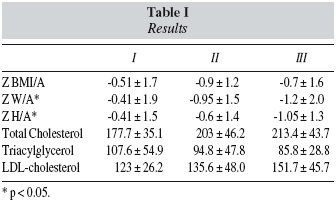My SciELO
Services on Demand
Journal
Article
Indicators
-
 Cited by SciELO
Cited by SciELO -
 Access statistics
Access statistics
Related links
-
 Cited by Google
Cited by Google -
 Similars in
SciELO
Similars in
SciELO -
 Similars in Google
Similars in Google
Share
Nutrición Hospitalaria
On-line version ISSN 1699-5198Print version ISSN 0212-1611
Nutr. Hosp. vol.25 n.2 Madrid Mar./Apr. 2010
Ketogenic diet in epileptic children: clinical and laboratory assessment
Dieta quetogénica en niños epilépticos: evaluación clínica y laboratorial
Introduction
Epilepsy is the most frequent neurological pathology in children, and in some cases it has no adequate control with drug treatments1. The improvement of epilepsy control observed during starvation periods triggered the development of a diet that simulates its alterations, allowing its use to treat difficult to control epileptic patients. Many researchers have been demonstrating the efficacy of the ketogenic diet (KD) on controlling epileptic children2. The mechanisms involved still remain unknown, though3.
Objective
Assess clinical and laboratorial aspects of difficult to control epileptic children submitted to KD for a period of 18 to 24 months.
Material and methods
20 patients (10 boys and 10 girls) with median age of 6 years and 2 months were assessed three times: assessment 1 - inpatient service to start the diet; assessment 2 - 6 to 12 months and assessment 3-18 to 24 months after beginning the treatment. Weight and height measurements, and serum lipids and triacylglycerol dosages were assessed. A vitamin and mineral supplementation was prescribed. The ANOVA statistical test was used to compare the analyzed parameters.
Results
Clinical and neurological improvements were observed in all patients. Significant decrease occurred for the medium values for weight/age (W/A) and height/age (H/A) Z scores (p < 0.05), which didn't occur with the BMI/age. Significant increase on the medium values for the serum total cholesterol and LDL-cholesterol (p < 0.05) had also been observed. The medium values for serum triacylglycerol had decreased, but it was not statistically significant (table I).
Discussion
KD can provide a better control for epileptic children. Considering all the nutritional restrictions involved, it is possible that alterations on growth and nutritional status may occur4. The decrease on the W/A and H/A outcomes was probably consequent to the low caloric amount offered by the KD. The stability of the BMI/A shows a proportional growth stop (table 1). The higher amount of saturated fats ingested during the study caused an increase on serum lipids. The individual ability to metabolize fats contributed to normalize them (or not). The serum lipids dosage had evidenced a significant increase in the medium values of total cholesterol, consequent to an increase of LDL-cholesterol.
Conclusions
The growth velocity reduction observed in these patients, as well as the increase on the concentrations of serum lipids, indicate that the use of KD for longer periods should be discussed with rigorous criteria. Despite the clinical benefit, evidenced by the neurological improvement, there's the need of follow-up, even after stopping the diet. The catch-up of growth must be assured to guarantee the nutritional safety of the diet.
R. Tumas, A. Lopes Cardoso, M.ª J. Marques-Dias and M.ª A. Vieira
Instituto da Criança. Hospital das Clínicas da Faculdade de Medicina da Universidade de São Paulo. Brasil.
References
1. Vasconcelos MM et al. Ketogenic diet for intractable epilepsy in children and adolescents: report of six cases. Rev Assoc Med Bras 2004; 50 (4): 380-5. [ Links ]
2. Freitas A, Paz JA, Casella EB, Marques-Dias MJ. Ketogenic diet for the treatment of refractory epilepsy - a 10 year experience in children. Arq Neuropsiquiatr 2007; 65 (2-B): 381-4. [ Links ]
3. Freeman JM, Kossoff Eh, Hartman AL. The ketogenic diet: one decade later. Pediatrics 2007; 119: 535-43. [ Links ]
4. Neal EG et al. Growth of children on classical and medium-chain triglyceride ketogenic diets. Pediatrics 2008; 122: e334-e340. [ Links ]
![]() Correspondence:
Correspondence:
Rosana Tumas.
Instituto da Criança.
Hospital das Clínicas da Faculdade de Medicina da Universidade de São Paulo.
Av. Eneas de Carvalho Aguiar 647.
CEP: 05403-000 Cerqueira César - São Paulo - SP - Brasil.
E-mail: rosana.tumas@icr.usp.br
Recibido: 16-XII-2009.
Aceptado: 25-XII-2009.















